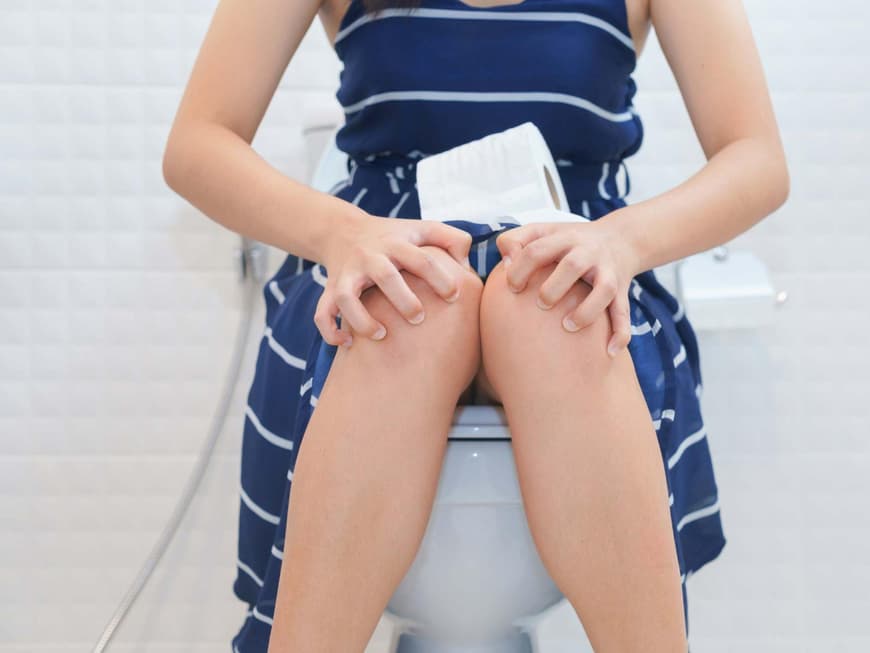
When are your stools too soft?
A diagnostic tool for determining the shape and consistency of your stool is the Bristol Stool Shape Scale. This scale distinguishes between a total of seven stool forms. The passage time of the stool in the intestine decreases from type 1 to type 7. The best consistency is type 4 on the scale. Your bowel movements have a particularly good consistency if they are both soft and well-formed and resemble a sausage. Ideally, no stool residue should stick to the toilet paper when you use it. However, it is also possible that your stool is soft but has a cracked rather than smooth surface. Here too, the consistency is still within the ideal range. This consistency corresponds to type 3 on the Bristol Scale.
From type 5 onwards, however, stools are said to be too soft, as they no longer have the ideal shape, but are excreted in the form of individual, soft, smooth-edged lumps. However, as long as you can still pass this stool regularly and easily, there are usually no signs of illness. However, if the edges are no longer smooth but irregular and the consistency is rather mushy, this is the first preliminary stage of diarrhea. If this lasts longer and you also suffer from flatulence or a feeling of fullness, there is a need for action.
The last stage on the Bristol scale is type 7: liquid or watery stools. This is referred to as diarrhea or diarrhea. The intestinal transit time is considerably too short and your fluid loss is particularly high. If the diarrhea lasts longer than three days, you should consult your family doctor. If necessary, they can refer you to a specialist for digestive diseases, a so-called gastroenterologist.
Important: Regardless of whether you have soft or hard stools - whenever you notice blood in your stool, you should see a doctor immediately. Blood in the stool can look very different and have various causes, which should definitely be clarified.
Sticky stools: why you should have them checked
The significance of stool color
It's not just the shape but also the color that indicates why your bowel movements might be too soft. We list the colors and possible problems. The consumption of food is also decisive for the color:
- Brown: The color is caused by the brownish digestive juices. With a normal bowel movement, everything is fine.
- Black-brown to black: Such a dark stool color can have various causes such as a) Food, e.g. dark chocolate or spinach. b) Medication such as charcoal or iron tablets. c) If neither of these is the case, you should consult a doctor, as this could also be due to bleeding in the upper gastrointestinal tract.
- Green: People who eat a lot of vegetables often have greenish stools - which are also usually softer. If this is not the case, the color could indicate an intestinal infection.
- Yellow: Unless you have eaten a lot of carrots, yellow stools can also be an indication of an intestinal infection. Caution is advised if the stool stinks and floats on top of the water: This could be an indication of a problem with the pancreas. Off to the doctor!
- Red: Either red vegetables or fruit have been eaten. Or there may be blood in the stool - please have it checked!
- Greyish: There could be a problem with the digestive juices, it is better to ask the doctor for advice here too.
Digestive problems? The 7 most important questions about digestion
What is the normal amount of stool?
The amount of stool can vary greatly from person to person and is usually also heavily dependent on diet. The normal range is 100 to 500 grams per day. Someone who eats a low-fiber diet, for example, will excrete a smaller amount of stool than someone who follows a vegetarian diet. Fiber is therefore important to keep your digestion and intestines on track! The frequency of bowel movements can also vary greatly from three times a day to three times a week. So if you don't have to go to the toilet every day, you don't necessarily have constipation.
Causes of excessively soft stools
There are many causes of soft stools and diarrhea. A distinction should be made as to whether the bowel movements are permanently too soft and therefore chronic illnesses are present or whether the soft bowel movements are an acute problem. If your bowel movements are chronically too soft, this can often be attributed to irritable bowel syndrome. What causes this is not yet sufficiently known. However, doctors assume that the intestinal barrier is damaged. Other causes of soft stools can also be
- Food intolerances (e.g. lactose or fructose intolerance)
- bacterial overgrowth in the intestine
- hyperthyroidism
- chronic inflammatory bowel disease (e.g. Crohn's disease or ulcerative colitis)
- cystic fibrosis (congenital metabolic disease)
- bowel cancer
- Disorders of intestinal motility
- Taking certain medications
Acute problems with soft stools are often caused by gastrointestinal infections, which can be caused by pathogens such as viruses, bacteria, protozoa or intestinal parasites. These infections are highly contagious.
However, not only an infection, but also stress and strain can cause excessively soft stools accompanied by symptoms such as abdominal pain. Have the shape, color and smell also changed? This can have an impact on your health! The body reacts too classically with gastrointestinal complaints when we are under too much stress. If you are also very excited or particularly nervous, for example before an exam, your bowels may be activated and try to excrete the stool quickly. This results in short passage times and the stool is softer than usual, even leading to diarrhea. However, before you focus exclusively on stress, physical causes should really be ruled out. In addition to symptoms such as nausea and vomiting, eating spoiled food can also trigger excessively soft stools. A general lack of vitamin B12 can also be a cause. Important: A healthy intestinal flora can be disrupted and even destroyed by taking antibiotics, for example. This could also be a cause of soft stools.
Irritable bowel syndrome symptoms
Irritable bowel syndrome is a very common diagnosis that affects women twice as often as men. Symptoms of irritable bowel syndrome include nausea, abdominal pain, bloating, a feeling of pressure and fullness as well as diarrhea or constipation. As described above, there are often no known triggers or causes for irritable bowel syndrome - so you can say that you have irritable bowel syndrome if there are no physical causes or if none are identified or known. In this case, you should play detective and keep a food diary to track down any food intolerances. Irritable bowel syndrome can also be triggered by stress, but physical complaints or intolerances should be completely ruled out first.
Soft stools: what can you do about them?
There are a number of foods that you can use to "thicken" your bowel movements if they are too soft. These include wheat bran and baked goods made from white flour, such as white bread, crackers or pancakes. Pasta and rice are particularly suitable as nutrients, while ice cream and pudding lead to a thickening of the stool.
Fruit and vegetables that are particularly suitable are apples, grated without the skin, dried blueberries, bananas, eggplants and carob flour. There are also additives available from pharmacies, such as psyllium, apple pectin or karaya, which can also help to improve the consistency of your stools. These products do not require a prescription.
Soft stools: better to avoid these foods!
There are also some foods that you should consciously avoid if your stools are too soft or these foods can cause soft stools. These are
- Mineral water with magnesium
- fatty foods
- Hot and spicy foods
- sugar substitutes (e.g. sorbitol)
- coffee
- milk products
- Fructose (fruit sugar)
- alcohol
- chili
- Cabbage vegetables, such as sauerkraut, cauliflower or white cabbage
If you have an infection, carrot soup can help, as cooking carrots produces tiny sugar molecules. These are confusingly similar to intestinal receptors and ensure that the bacteria do not attach to the intestinal wall but to them and are therefore excreted. However, if these remedies do not work for you, it is advisable to consult a doctor to get to the bottom of the exact cause.
How should you eat for optimal bowel movements?
To ensure that your stools are "perfect", you should eat a balanced and varied diet. This includes sufficient carbohydrates and fiber (cereal products, fruit, vegetables, legumes) as well as sufficient protein (meat, fish, dairy products, legumes). Vegetarians and vegans use appropriate substitute products. Drinking is also a very important factor - the intake of sufficient fluids is often underestimated. At least 1.5 liters of water a day is recommended. You should also exercise regularly, which also keeps the intestines on their toes.
Read also:
Home remedies for constipation
Tips for healthy intestinal flora
Irritable bowel syndrome: what to do when digestion goes crazy
The irritable bowel diet
Getting through gastrointestinal infections well: How to get well quickly
Does leaky gut syndrome really exist?
Quick help: banish stomach germs with yeast
Healthy gut bacteria: Small, important helpers






